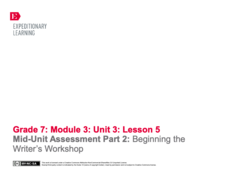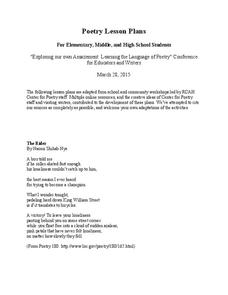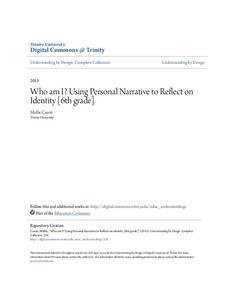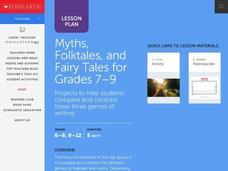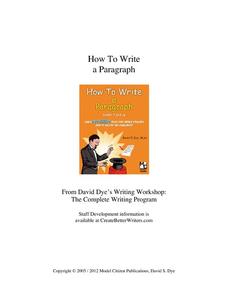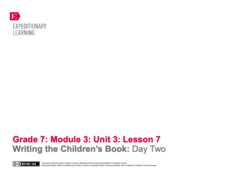EngageNY
Mid-Unit Assessment Part 2: Beginning the Writer’s Workshop
Writers learn about using sensory details as they revise bland sentences with more vivid language. Next, they begin writing the first drafts of their children's books, completing storyboards to effectively plan their writing.
Poetry4kids
Five Ways to Overcome Writer’s Block
Every writer knows how terrible writer's block can feel. Use these five writer's block-busting techniques to help young writers get out of their rut and into a better state of mind.
Apple State University
Friendly Letter Mini-Lesson
This mini-instructional activity about informal letter writing is packed with a lot of information about writing a friendly letter. Class members begin by working in pairs to answer questions after reviewing letter models. Then, take...
MENSA Education & Research Foundation
The Writer’s Toolbox: What You Need to Master the Craft
Strengthen your high schoolers' writing with a series of steps for writing successfully. With sections on organizing an essay, choosing a topic, crafting a thesis statement, and revising a draft, the lesson encourages your class to...
Curated OER
Plagiarism Workshop
What do George Harrison, Vanilla Ice, and Steven Ambrose all have in common? The Warner Brothers’ films Batman Forever and The Devil’s Advocate? All are guilty of plagiarism. And if you are considering a research project and want to...
Residential College in the Arts and Humanities
Poetry Lesson Plans
Need some ideas for poetry lessons? Check out this packet loaded with suggestions for elementary, middle, and high school writers.
Curated OER
Nonfiction Genre Mini-Unit: Persuasive Writing
Should primary graders have their own computers? Should animals be kept in captivity? Young writers learn how to develop and support a claim in this short unit on persuasive writing.
Curriculum
Expository Writing
The beauty of the way this expository writing resource is structured is that the units can be presented as a complete writing workshop or sequenced throughout a course of study
Teaching Tolerance
In Our Own Words: A Story Book with a Purpose
Academics turn into storytellers in an engaging activity on activism. The activity focuses on promoting social change in local communities with stories. Young historians plan a storybook to target a specific audience and social issue and...
New York State Education Department
TASC Transition Curriculum: Workshop 5
Are video games sports? Pupils investigate this question as well as various nonfiction selections to learn more about claims and the support that defines them. All of the selections mimic the rigor on state tests and encourage close...
Trinity University
Who Am I? Using Personal Narrative to Reflect on Identity
Who am I? Pupils work to answer this question through a unit that explores personal narratives and identity. Exit tickets for activities that examine different poems, short stories, and autobiographical writing serve as prewriting for...
Scholastic
Myths, Folktales, & Fairy Tales for Grades 7-9
Here is a must-have resource for studying fairy tales, myths, and folktales with your class! It includes instructional ideas, activities, and materials to support a month-long review of these three unique genres of writing.
Model Citizen Publications
How To Write a Paragraph
Instructing learners on how to craft a good paragraph, a skill required of all writers, is the focus of a 23-page packet that includes directions, graphic organizers, exercises, and worksheets for guided practice.
EngageNY
Writing the Children’s Book: Day Two
Following a brief mini-instructional activity on using dialogue in fiction, young writers continue day two of their writing workshop. They work on the second half of their Children's Book Storyboards, and then they turn and talk with...
Scholastic
Step-by-Step Strategies for Teaching Expository Writing
A carefully crafted, logically organized, 128-page packet is an excellent addition to your unit on expository writing.
